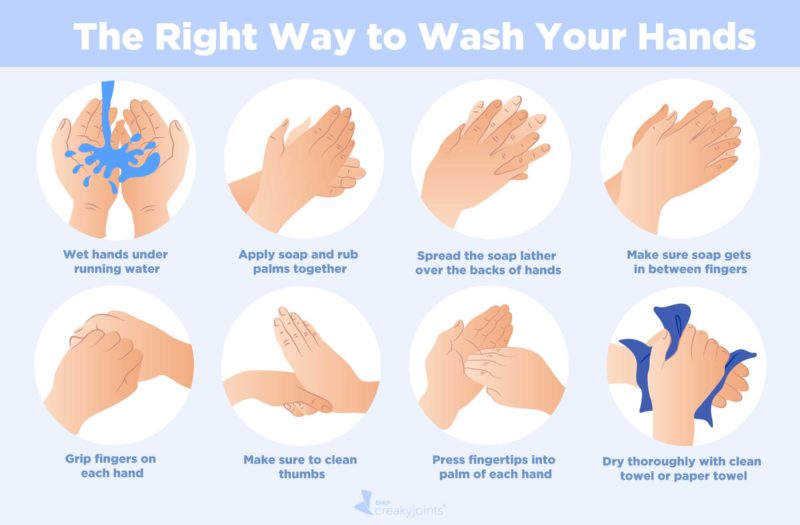Learn more about our FREE COVID-19 Patient Support Program for chronic illness patients and their loved ones.
This has been reviewed and updated as of May 4, 2020.
You’ve seen your share of social media posts questioning, “why is washing hands a new thing?” While the fact is that hand washing is a fundamental and highly effective hygiene measure that has been advised during countless past disease outbreaks, the truth is that many people still don’t wash their hands often enough or well enough to protect themselves or others from infections, including COVID-19.
And now that we have been living through this pandemic for a couple of months, it’s natural to be more lax about our frequent and thorough hand-washing habits from the early days of coronavirus. But we must maintain good hand hygiene, especially as more states “reopen” and we become more exposed to germs outside of our homes.
Here is a reminder of how and when to wash your hands. If you have an underlying health issue or chronic illness that increases your risk for coronavirus complications, share this with your loved ones to make sure they are taking the steps to help keep themselves — and you — safe.
When to Wash Your Hands
This is when the Centers for Disease Control and Prevention says you should wash your hands because they are key times when you’re likely to get and spread germs:
- Before, during, and after preparing food
- Before eating food
- Before and after caring for someone at home who is sick with vomiting or diarrhea
- Before and after treating a cut or wound
- After using the toilet
- After changing diapers or cleaning up a child who has used the toilet
- After blowing your nose, coughing, or sneezing
- After touching an animal, animal feed, or animal waste
- After handling pet food or pet treats
- After touching garbage
During the coronavirus outbreak, it is a good idea to also wash your hands each time you enter a new place (such as your workplace or school) and after being in a public place.
“There is no need to be obsessive about this. Just wash your hands,” according to Malia Jones, PhD, MPH, an assistant scientist in health geography at the Applied Population Laboratory at the University of Wisconsin-Madison, in a social media post about coronavirus. “A little bit more effort here goes a long way.”
How to Wash Your Hands
These are the main steps to follow, according to the CDC. Although this may sound simple, if you’ve ever seen a 7-year-old wash their hands before dinner, you know they don’t follow all of them. And one study in which researchers secretly observed thousands of people while they washed their hands found that only 5 percent followed all the rules.
- Wet your hands with clean, running water (warm or cold), turn off the tap, and apply soap.
- Lather your hands by rubbing them together with the soap. Lather the backs of your hands, between your fingers, and under your nails.
- Scrub your hands for at least 20 seconds. Need a timer? Hum the “Happy Birthday” song from beginning to end twice.
- Rinse your hands well under clean, running water.
- Dry your hands using a clean towel or air dry them.
When you can’t wash your hands with soap and water, the CDC suggests using an alcohol-based hand sanitizer with 60 percent alcohol. Yes, these are hard or impossible to come by right now. That’s one reason why hand washing is better. Others including that sanitizers do not get rid of all types of germs and hand sanitizers may not be as effective when hands are visibly dirty or greasy.
Get Free Coronavirus Support for Chronic Illness Patients
Join the Global Healthy Living Foundation’s free COVID-19 Support Program for chronic illness patients and their families. We will be providing updated information, community support, and other resources tailored specifically to your health and safety. Join now.
Borchgrevink CP, et al. Handwashing Practices in a College Town Environment. Journal of Environmental Health. April 2013. https://msutoday.msu.edu/_/pdf/assets/2013/hand-washing-study.pdf.
When and How to Wash Your Hands. U.S. Centers for Disease Control and Prevention. https://www.cdc.gov/handwashing/when-how-handwashing.html.






